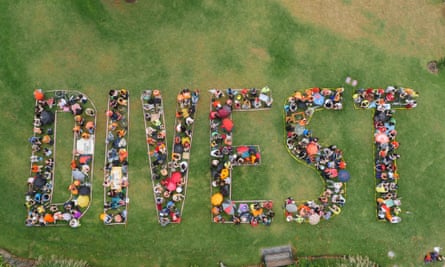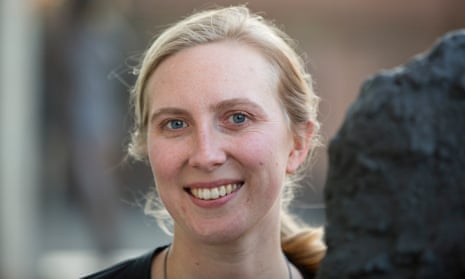At an age when many of her peers are making money in banks or making coffee in Brooklyn, 31-year-old May Boeve has quietly risen to the top of one of the world’s most disruptive and innovative environment organisations, 350.org. Boeve is one of the few women at the helm of a large green group in the US – a stratum called “as white and male as a Tea Party meet-up”.
“There’s a structural sexism problem, full stop. If you look at the numbers, they don’t lie. There’s just not as many women leading, in that sense – running the organisation, being the figurehead,” said Boeve.
It’s a failure, said Boeve, that excludes people from environmentalism at a time when its aims are necessarily universal.
“So many people feel connected to the climate change movement and it’s important for everyone who’s involved, whether they’re a school teacher in the UK or a farmer in Burundi, to see themselves in this movement. So the more leaders who reflect the diversity of the movement, the broader, the bigger, the stronger the movement will be.”
The public emergence of Boeve has been a deliberate attempt to diversify the 350.org message. She took over as executive director of 350.org when she was just 27. But the organisation has been publicly dominated by the talismanic figure of Bill McKibben, who stepped down as chair of the 350 board late last year, but remains involved in the movement.
“All of our stories are important,” she said.
Boeve first met McKibben at Middlebury College, Vermont, where she was a student activist and he a scholar in residence.
“I was one of those kids who ran lemonade stands to raise money for [animal rights group] Peta on the weekends. I was really into activism, I still am. To be part of a community who share this passion, this set of values, is what I want for my life,” she says.
She and some friends created three transparent maps of the US; overlaying coal mining, good potential for wind power and excellent craft beer. On this basis they chose Montana as a place to move to and get active. But just before they left, McKibben asked them to help organise the first ‘Global Day of Climate Action’. They never made it to Montana and Boeve has never had another job.
In 2008, 350.org began with six college friends – one for each inhabited continent – and McKibben. The name (it’s one of the first environmental organisations to use a website as its moniker) signifies the concentration of carbon dioxide (in parts per million (ppm)) the atmosphere can safely hold without changing our climate. We are currently around 400ppm.
Fresh out of college, Boeve was handed responsibility for 350.org’s operations in North America. At first the group worked on building a popular movement for climate action, focusing on single protest events like the International Day of Climate Action in 2009.
“The idea was ‘we’ll run this campaign and we’ll see what happens’. It’s only been recently that the idea that this is actually a long-term thing has become real,” she says.
With the publication of a landmark report in 2011, the movement found a place where it could go for the soft underbelly of its adversary – the money invested in fossil fuel companies.
McKibben seized on the idea. In his seminal Rolling Stone article outlining the arguments for divestment in 2012, he boiled down the future of the fossil fuel industry to a simple arithmetic – companies own at least four times more fossil fuel reserves than we can safely burn, so it must stay in the ground, so the reserves and the companies are overvalued.
Divestment movements had already begun popping up on campuses across America. Increasingly 350.org played a coordinating role in stitching the disparate students into a global force. Now, the fossil fuel divestment campaign is shifting money faster than any divestment movement before it.
“Mere months after the fossil fuel divestment campaign really took off, MSCI, which is one of Morgan Stanley’s offshoots, ranked divestment as the number one trend for investors to watch,” said Boeve.
After years of calling on politicians to act, Boeve said the perceived failure of the Copenhagen climate talks in 2009 convinced her that the real power lay elsewhere.
“The fossil fuel industry’s political power warps the entire debate, so it would be one thing if politicians were discussing climate policy in good faith, absent fossil fuel lobbying money. If that were the case, we’d have solved this problem by now. But divestment gives us a very direct way of calling into question the social license of the fossil fuel industry and that is in fact a tool to see the kind of policy change we need,” she says.

The Guardian has joined the divestment campaign, asking the Wellcome Trust and the Bill and Melinda Gates Foundation to dump their fossil fuel holdings. Wellcome’s director Jeremy Farrar argued in the Guardian that “active engagement” with fossil fuel companies was a more effective way to influence them than dropping their shares.
In response to Farrar’s comments, Boeve said: “We don’t see the kind of results from shareholder advocacy that we would like to see in changing corporate behaviour. Take ExxonMobil, the big bad wolf in the oil sector. The Rockefellers have had those shares for years and years. But I would argue that the Rockefeller Brothers Fund divesting had more of an impact in terms of shaping the public debate than shareholder activism has on Exxon.”
So now that money is shifting, what does winning look like for the divestment campaign? Boeve says the UN conference in Paris will give them the best indication of whether their approach is working. If governments produce a strong agreement, it will be a sign that the fossil fuel industry has lost its legitimacy and its hold on democracy.
Beyond Paris, she says, it is hard to know what form the climate movement will take. 350.org has no long-term strategy, preferring to take the shape required by the moment.
“What form it takes is hard to know because it’s hard to know what happens with climate change. We’re racing against the clock on trying to mitigate emissions and keep fossil fuels underground, but it’s very difficult to know what this world is going to look like in 10 years and therefore what does a group like 350 need to look like in the new reality.”

Comments (…)
Sign in or create your Guardian account to join the discussion